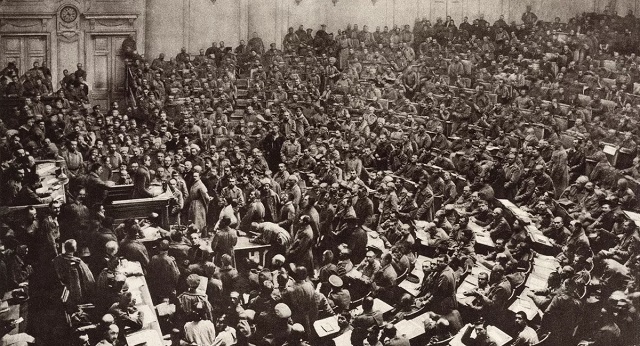In any revolutionary period we see the masses mobalise into their own organisations. Today in Latin America they're called Bolivarian Circles, in Russia they were called Soviets (literally meaning workers' councils), these same councils sprung up in France, Germany and across Eastern Europe in times of advanced class struggle.
In Russia in 1905, the trade unionists understood that only by strengthening solidarity beyond their own interests, would they be able to wage a successful struggle. In the past, several strike committees would form in a single city, and the secret police would arrest one group one day, and move to the next the day after. The workers of Ivanovo-Voznesensk knew that only by uniting all the workers throughout the city, despite their various differences and needs, could a broad struggle be successful. In the truest sense of the word, these workers were Russia's first Communists. Thus, spontaneously arising from the masses of striking workers, without guidance from any political party, came the Soviets.
A council of the workers, representing the broad interests of all the working people. These spread rapidly across Imperial Russia. Reaching their peak over 10 years later, when the soviets themselves demanded they should be the state. Replacing the old Tsarist institutions and the useless parliament, with organisations made, occupied and controlled by ordinary people. The Bolshevik's who had only a small minority in the soviets at the start of 1917 won the majority over on a program of "all power to the soviets".
"The Soviet was the axis of all events, every thread ran towards it, every call to action emanated from it." 1905, by Leon Trotsky.

This is what a soviet looked like in action, this is the Petrograd Soviet, there were over 10000 such councils across the whole of Russia before October took place. In this particular soviet some 20000 workers had been elected to it in just 4 years.
This is what democracy looks like in action. Not one parliament in the country where maybe 500 people get elected every 5 years. Thousands of such parliaments where thousands upon thousands of ordinary people are elected, and importantly can be instantly recalled when they don't do what their electorate want them to. They manage all affairs, from production of the steal mill where they work, or how much they should spend on welfare, or how many buses they need running on this route at that time and so on.
So the next time you hear someone on £150 000 a year talk about democracy, and elections every few years just remember how hollow such a democracy is, a democracy where the masses don't participate at all, someone rich, someone powerful, someone who "understands" how things should be done is running it all on your behalf, almost in secret. That isn't democracy, that isn't even close.